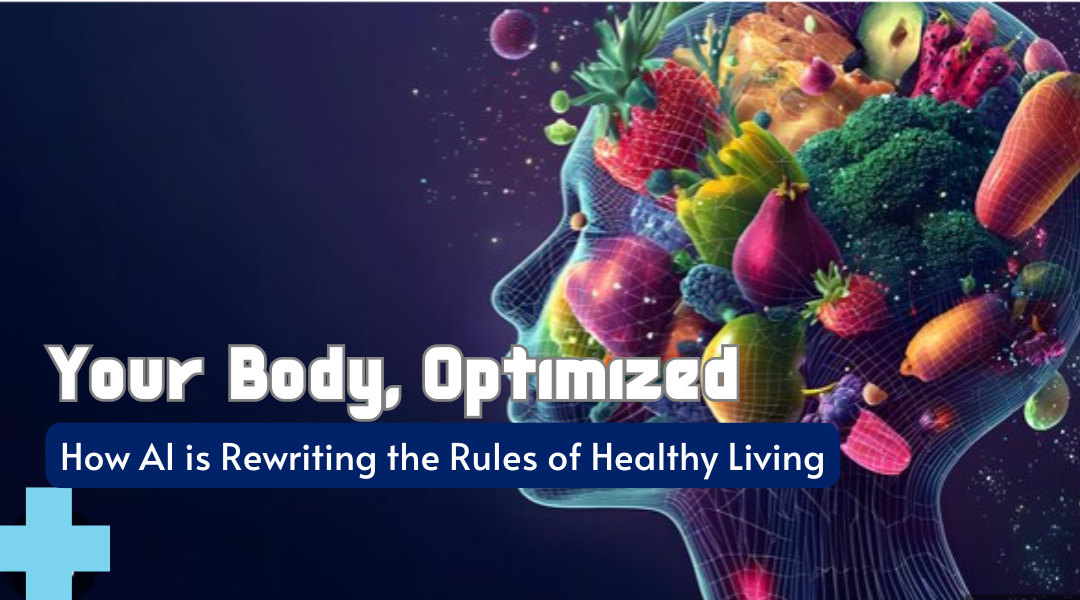We’ve entered an era where “healthy living” no longer means following generic advice from magazines or struggling through one-size-fits-all diet plans. Thanks to artificial intelligence, true wellness is becoming deeply personal—adapting to your unique biology, lifestyle, and goals in real time. This isn’t just about living longer; it’s about feeling your best at every age.
Why Generic Health Advice Falls Short
Remember when everyone was told to drink eight glasses of water daily or avoid all fats? We now know health doesn’t work that way. Your coworker thrives on morning runs while you feel best with yoga. Your neighbor loses weight on keto while you need more carbs. AI finally acknowledges what doctors have always known: we’re all different.
How AI Crafts Your Perfect Health Plan
- Food That Actually Works For You
- Forget calorie counting. New apps analyze your DNA to reveal whether you metabolize fats efficiently or need more antioxidants.
- Your smartwatch notices your energy crashes after lunch? The system tweaks your meal plan by dinner time.
- Managing diabetes or PCOS? The algorithm prioritizes blood sugar-balancing foods without you lifting a finger.
- Fitness That Fits Your Life
- That 5 AM spin class everyone raves about? If your biometric data shows you’re a night owl with better evening endurance, AI will suggest sunset workouts instead.
- Recovering from an injury? Motion sensors adjust your routine to protect weak joints while building strength.
- Stress Management That Reads You
- Your smart ring detects subtle heart rate changes during meetings with a particular client—before you even notice your clenched jaw.
- Instead of generic meditation apps, you get prompted with specific breathing techniques when your stress markers spike.
- Sleep Optimization That Works
- It’s not just about eight hours. AI cross-references your sleep cycles with diet, caffeine intake, and even room temperature to pinpoint why you wake at 3 AM.
- Light sleepers get different recommendations than deep sleepers—no more useless “avoid screens” advice if your issue is actually blood sugar drops.
Real Life Wins: Mark’s Turnaround
At 38, Mark was stuck in the “overweight but not obese” zone—too “healthy” for medical intervention, but constantly fatigued. His AI health coach spotted the patterns:
- His cortisol peaked at 10 AM (explaining his 11 AM donut cravings)
- His genetic data showed poor folate conversion (linked to his low energy)
- His sleep tracker revealed he was getting REM sleep at the wrong times
Three months of personalized tweaks—timed nutrient intake, adjusted workout intensity, and targeted supplements—had him feeling 10 years younger without drastic lifestyle changes.
The Caveats No One Talks About
For all its potential, this tech isn’t magic:
- Privacy Paradox: That DNA test revealing your ideal diet also knows your Alzheimer’s risk. Who else gets that data?
- The Motivation Gap: The fanciest algorithm can’t help if you ignore its advice. Some days, pizza wins.
- Human Touch Still Matters: An AI might spot abnormal thyroid markers, but you’ll still need a doctor to interpret what they mean for you.
The Future is Already Here
This isn’t sci-fi—it’s happening now in ways most people miss:
- Your gym’s motion-capture mirrors adjusting your squat form in real time
- Pharmacies offering “smart” vitamin packs tailored to your latest blood test
- Restaurants where your menu highlights dishes matching your health profile
The revolution isn’t coming—it’s already on your wrist, in your phone, and soon, woven into every health decision you make. The question isn’t whether AI will change wellness, but whether you’ll use it wisely to change yours.
The Bottom Line
The healthiest version of you isn’t found in a textbook or trending diet—it’s being discovered daily through data you generate just by living. As these tools get smarter, they’re not replacing human judgment; they’re finally giving us the personalized insights we need to make better choices. After centuries of medical guesswork, we’re entering the age of precision wellness—and our future selves will thank us for it.
